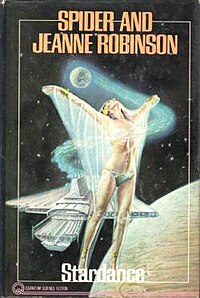 First appeared in Analog as a novella. It went on to sweep the Hugo, Locus and Nebula awards that year and was reprinted by Terry Carr, Gardner Dozois, Samuel R. Delany, and Isaac Asimov in various Year's Best. The combined novel was fourth in the Locus Award poll. Here's a website for a proposed movie based on the novella. To read the "Stardance" novella online, click here (the first section).
First appeared in Analog as a novella. It went on to sweep the Hugo, Locus and Nebula awards that year and was reprinted by Terry Carr, Gardner Dozois, Samuel R. Delany, and Isaac Asimov in various Year's Best. The combined novel was fourth in the Locus Award poll. Here's a website for a proposed movie based on the novella. To read the "Stardance" novella online, click here (the first section).- For part 2 of Stardance, click here.
- For Starseed, the second novel, click here.
- For the final novel in the trilogy, Starmind, click here.
"Stardance"
Summary:Shara Drummond is a terrific dancer but too large-boned and busty to succeed in the dance industry. As the narrator, Charlie, is a good but failed dancer himself, he is meant to break the news to Shara that she won't make it. Instead, Charlie quits his job to video Shara on her own to make her a star that way.
Except they fail. They go their separate ways. Charlie plunges into his bottle and tanks his career. Shara, meanwhile, find a backer, tycoon Bryce Carrington, who will take her to a setting dance hasn't been taken before: zero gee with a backdrop of the stars. She picks Charlie to film her.
Things get worse. To build her career, she has to get three dances made, but if she makes them, she will die as her body parts deteriorate, unable to live again on Earth.
Visitors arrive.
Commentary:I read and loved the novella and kept the novel to finish one day as a child who puts aside a favorite chocolate bar for a rainy day. The novella may be Robinson's crowning achievement.
At its core is an emotional dynamo. While Charlie is the narrator, Shara is the protagonist. There's a reason why this must be. Shara's and Charlie's troubles keep us invested up to the climax. The plot and characters keep us invested. The writing is more smooth than ornate or literary--a style more in vogue back in the Seventies than at present. Other tastes have changed, addressed later on.
Robinson has a voice that sucks you in to be buddies. His characters are fiercely protective to the point of being combative. They speak their opinions boldly, in much the same way a Heinlein character might, with the insult becoming a backhanded compliment.
Robinson also propounds his own ethos, such as taking compliments without dodging them, saying what you mean, and standing/dancing boldly in your birthday suit, etc. It's part of Robinson's charm--part of its day. I've mentioned before with other writers of the day such as Lawrence Watt-Evans, coming of age in the Sixties and Seventies, the culture worked hard to make nudity important, appreciating the human body:
"Where Norrey was small, Shara was big, and where Norrey was big, Shara was bigger. If I'd seen her on the street I might have whistled appreciatively--but in the studio I frowned."
 The culture pendulum may have swung enough to make this passage inappropriate, but as a pendulum, it keeps swinging. [Not that my opinion sways to either party, but it's irrelevant to this discussion.]
The culture pendulum may have swung enough to make this passage inappropriate, but as a pendulum, it keeps swinging. [Not that my opinion sways to either party, but it's irrelevant to this discussion.]Speaking of swinging, Charlie takes a punch at Bryce Carrington for trying to save Shara's life. Why? Because Shara wants to risk her life in order to dance. She might not ever get to her third dance in time to get the public to appreciate her work if she doesn't get to all three. If Charlie is in love with her, wouldn't he want her to live? Men exist who would do such a thing, put the woman's desires above all concerns if she does. Now Charlie is jealous of Carrington getting to sleep with her, so this might be just an excuse. But it's still surprising that he doesn't credit Carrington at least that. But then again, I tend to favor emotional complexity.
The genre has a default mode of abstraction whenever it enters gestalt mode or describing-the-undescribable mode. I rolled with it as a kid, worried over it as I learned more about writing, and accepted it later as necessary. Also, it allows writers to philosophize.
The true power in this novella is the idea that people who seem to have no place, whatever their handicap--people who don't fit the standard mold of success--can carve out their niche of success if they keep searching. The theme, no doubt, resonated with readers then as it should today. The novella is emotionally involving, and worth a gander to bone up on your SF history. A movie might work out well.

No comments:
Post a Comment